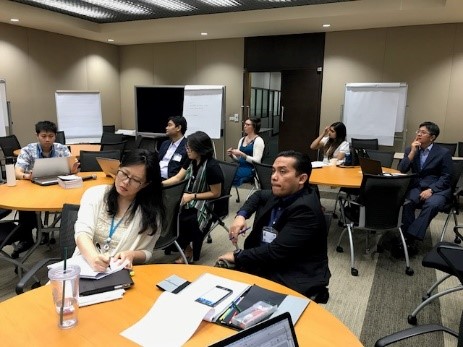Regional consultations was held and led by each Regional Commission, ESCAP facilitating the consultation of Senior Programme Managers for UN-Water Members working in the Asia-Pacific region. This event is a validation meeting to consolidate regional recommendations, based on a preliminary online survey and is open only to UN-Water members and Partners. Two topics were discussed during the meeting. The first topic was related to the potential establishment of an Asia-Pacific UN Water Working Group under the UN Water Regional Commission’s (RCM) Thematic Working Group on Resource-Efficient Growth (TWG-REG). Specific activities on UN-Water coordination at the regional level should be incorporated in the TWG REF work plan.
There is interest in having closer collaboration on UN-Water issues at the regional level and that the TW REG is the best avenue for this. Several participants voiced the desire that this group be formally created under the TW REG, in order to formalize the collaboration. Other participants believed this group needs to be considered as a ‘coalition of the willing’, and hence ought to be flexible and light in its operation. It was agreed that whatever the format, the group should enshrine its activities in a workplan, which can be accomplished within the mandate and that add value without requiring more funding.
The TWG REG is a UN group only. As UN-Water has UN Members but also numerous non-UN partners, it would be important to consider engagement within the UN, including with Agencies not currently represented in the TWG REG and outside the UN system. The RCM also provides an opportunity to broaden the reach to partners that do not necessarily engage actively in the water sector now.
There were some consideration and inputs made by participants that is in line with the ongoing effort:
- A half-day SDG11 Clinique will occur prior to the APFSD, organized by UN-Habitat, targeting 3-5 countries, to review state of implementation, challenges and needs. A similar process could be explored for SDG6.
- Integrated Water Resource Management-related process in the region have significant history that could be learnt from: The Network of Asian River Basins Organizations (NARBO) process, OECD, among others.
- The Global Water Partnership South East Asia is developing an SDG 6 readiness index, currently at the concept stage (ie: funding still to be secured)
The second topic was related to SDG Regional Monitoring. There are opportunities on how to present the regional monitoring, those are through (i) UN Water SDG6 synthesis report and (i) APFSD Roundtables. The possible activities to do are (i) mapping of current state of SDG6 data and monitoring efforts for the Asia Pacific region; and (ii) based on the mapping, highlights further needs and emerging issues.
Towards the end of the discussion, it was agreed that there are several immediate actions to be taken:
- Circulate the consultation report with participants and participants who sent their apologies for the meeting for final comments
- Check with the supporting division for the RCM the options for: a). creating a formal or informal group under the TWG REG; b) engaging non-UN stakeholders in the work of the group (through ESCAP or directly) and c). modalities for engaging with other TWG under the RCM.
